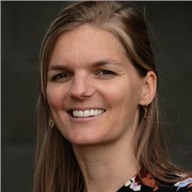"The commercial aspect of my job feels like a second nature"
What if ...? And what would happen if we do a little more of this, and a little less of that? These are the kinds of questions Karolien Vermeiren (Business Development Manager) deals with. As a member of the VITO team on Spatial-Dynamic Modelling, she investigates how well-defined policy choices can change the world we live in - in terms of living, working and mobility as well as nature and climate.
Vermeiren and her team do this mainly by means of spatial simulations and models, so that policymakers get a reliable estimate of what the consequences of their decisions might be. This field of research is highly multidisciplinary and one that is growing in importance lately - especially since we can no longer ignore the detrimental effects of spatial (dis)order. "That is a big difference with my PhD, in which I simulated the growth of African cities," says Vermeiren. "At the time, that work was not picked up by those who could do something about it."
You joined VITO fairly quickly after completing your PhD at the end of 2014. How was your transition from the academic world?
"In essence, I continued to do the same as at KU Leuven, i.e. develop spatial models based on existing data and use them to simulate how all kinds of geographical, but also social and economic aspects are very likely to change. During my PhD research, I did this for some cities in Africa. I simulated their growth (and more specifically their 'urban sprawl') using data such as population growth and economic indicators. It was very interesting but I didn't feel that anyone was taking it further."
And this is now different?
"Definitely. We provide an indispensable sounding board for policymakers, as we investigate and simulate the consequences of their decisions in almost all areas of society. From spatial planning and energy, mobility and air quality to climate."
Our most important customer is the Flemish government. Our region is known for its own form of urban sprawl, which is currently a hot topic. Just look at the construction boom, the costs of dispersed development and parcelling, traffic jams, but also, for example, at the opposition to windmills in the countryside. Policy makers have really begun to look at these issues in recent years. We also notice that environmental thinking, which is typical for spatial modellers like us, is becoming more and more popular with governments and companies."
What change have you seen in your domain in recent years?
"The role of ICT solutions has increased even further. More and more overview maps are created automatically, whereas a few years ago we still did them manually, i.e. sitting at a computer screen. As a result, these maps are now more user-friendly for the users, our customers. They like the fact that the maps are interactive, for example, and that during the presentation of a map you can change a few things, such as the weight of certain parameters."
To what extent do you still feel like a researcher, which is what you were trained to be after all?
“You're right that I have a strong scientific basis, but my VITO business card has read 'business developer' for about four years now. At the same time, I am also involved in research, fundamental simulation and modelling work. This combination is not easy - sometimes it is difficult to maintain a balance - but I like it. The commercial aspect of my job - screening tenders, guiding offer processes towards projects, but also maintaining a network - now feels like second nature. I already had this need for human contact at university, where I really enjoyed my job as a practice assistant, for example."
More info
karolien.vermeiren@vito.be


